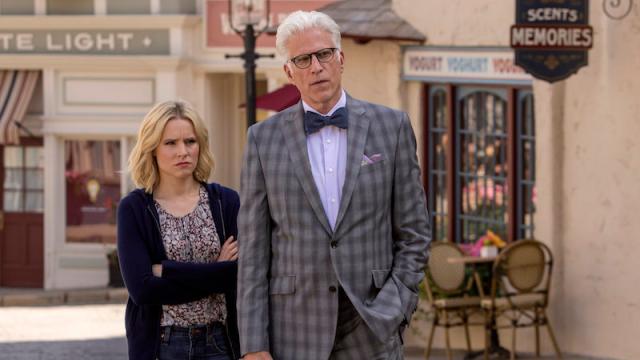In The Good Place, Eleanor Shellstrop (Kristen Bell) is a woman who dies and goes to the titular afterlife, a quaint paradise that is almost perfect — except for the fact Eleanor is a terrible person who has arrived there by mistake. It’s an unusual plot for a primetime sitcom, even more so since The Good Place also functions as a stealthy class on morality (well, not that stealthy, as one of the characters is literally a professor of ethics). But what’s really fascinating is how entertaining the show still manages to be.

To understand the series, you first need to understand its version of the afterlife. There are only two afterlives: the Good Place and the Bad Place. A mathematical formula determines who goes where, but only a small portion of the very best people on Earth get to spend eternity in the Good Place, while everyone else goes to the Bad Place. The show focuses on Eleanor’s journey to become a better person to in order to keep from being discovered and sent to the Bad Place. She enlists/conscripts Chidi, her assigned “soul mate” and the aforementioned ethics professor, to teach her how to be good.
If Westworld is a philosophy graduate school, The Good Place is more like Moral Philosophy 101. Through Chidi’s education of Eleanor, it gives the basics of Kant, Marx, and Socrates’ ideas on moral philosophy, which sounds like it should be annoying, but the show is so charming about it that you can’t really get mad. (“Who died and left Aristotle in charge of ethics?” asks Eleanor in one episode. Chidi points to his chalkboard, where the names Socrates, Plato, and Aristotle are written in giant letters and says, exasperatedly, “PLATO.”_
However, The Good Place isn’t quite satisfied with just name-dropping philosophers; over the course of the first season, the sitcom has questioned the nature of morality in several ways. Is knowledge enough to be a good person? Is it intentions that matter? Results? Is it about serving the greater good, no matter the cost?
The show’s theology is also used to critique moral absolutism in a way that is very relatable. The discovery that 99% of the population goes to the Bad Place, regardless of how good they were, is a disturbing aspect of the premise which underpins the entire series. The fact that the afterlife still manages to send people to the wrong location makes you question all of it judgment on, well, everything. And when we finally meet the people who run the Bad Place, they’re not Satanic or even sociopathic — they’re basically just douchebags. Trevor (Adam Scott) shows up and kicks over a chair. “Oh, hello, you look like a piece of crap, are you Eleanor?” he says. (He also demands she smile, which is awful.) Yes, there are many Trevors in the world, and they’re terrible to be around. But are they really deserving of an eternity of pain? Especially when, as Eleanor has proven over the course of the show’s first season, change is possible?
Again, none of these questions are particularly novel. It’s how good the show is at turning those questions into great television that makes it stand out. There’s a tendency to treat allegories of the human condition as great sprawling epics, but The Good Place is much more focused, much more willing to look at the most basic questions and say “There’s got to be a spectrum of answers to ‘good’ and ‘evil.’” Again, it’s also making a strong argument for the ability of people to change, and the potential goodness inherent in giving them that chance.
And the jokes are good! At one point, Eleanor is given a test to determine if she’s intrinsically a bad person, and one set of questions is entirely centered around watching The Bachelor. In the fall finale this past Thursday, Eleanor describes the Bad Place’s nights like this: “It was pretty classic torture, flying piranhas, lava monsters, college improv. And there was always jazz music playing.” During the day, she had to organise a baby shower for a woman she didn’t know, and she got an electric shock if she didn’t remember everyone’s names. Janet, the Good Place’s nigh omnipotent helper AI (played by D’Arcy Carden), would make most sitcoms alone.
For a comedy that’s more focused and funny than just about anything else on television, it’s kind of amazing that it’s also making some really great points about morality, too. In essence, The Good Place is a really good show about being good. What’s better than that?
